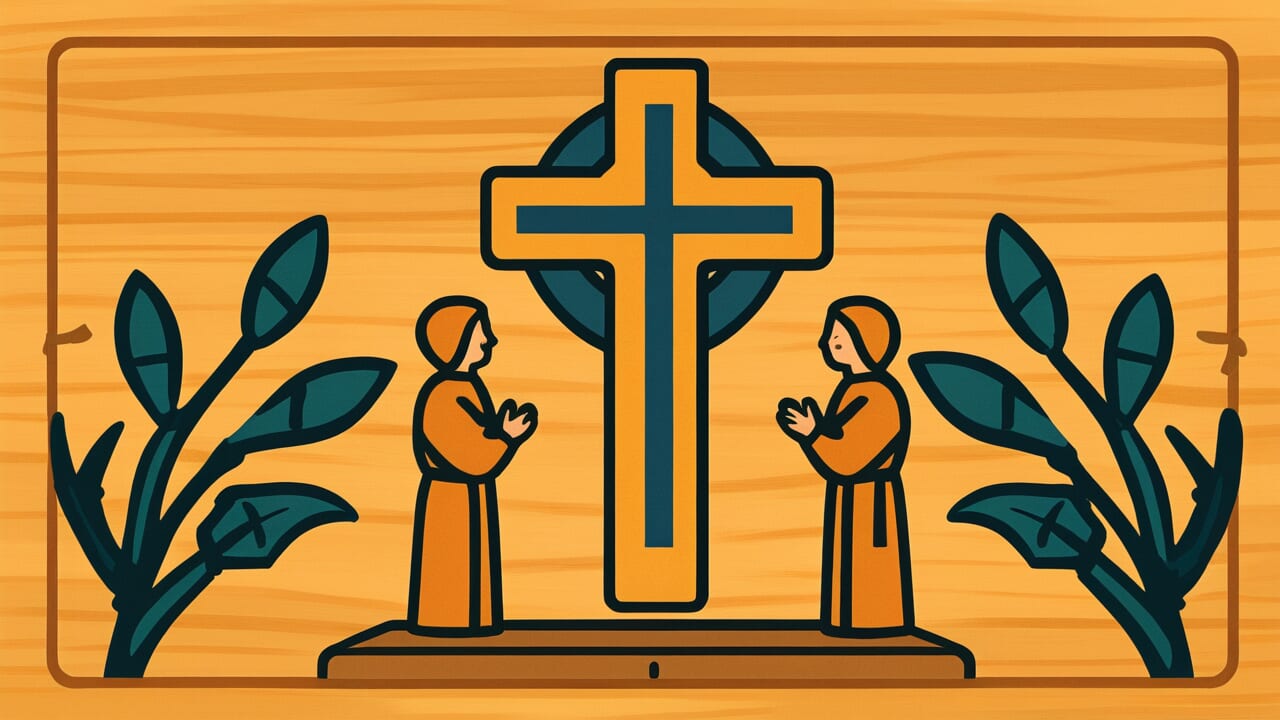How to Read “No cross, no crown”
No cross, no crown
[noh krawss, noh krown]
All words use common pronunciation.
Meaning of “No cross, no crown”
Simply put, this proverb means you cannot achieve great things without going through difficult times first.
The saying uses two powerful symbols from history. A cross represents suffering, hardship, and sacrifice. A crown represents success, achievement, and reward. The message connects these opposites with a clear rule. You cannot have one without the other.
This wisdom applies to almost every area of life today. Students cannot earn good grades without studying hard. Athletes cannot win championships without painful training. Workers cannot get promotions without proving themselves through challenges. The crown always comes after the cross.
What makes this saying powerful is its honest view of success. Many people want rewards without effort. They dream of crowns but avoid crosses. This proverb reminds us that worthwhile achievements require us to push through uncomfortable times. The difficulty is not a mistake or bad luck. It is the necessary path to something better.
Origin and Etymology
The exact origin of this specific phrase is unknown, though similar ideas appear throughout history. The saying combines Christian symbolism with universal truths about achievement. Early versions likely emerged when these religious symbols were widely understood.
The cross and crown imagery was meaningful during times when most people knew biblical stories. The cross represented Jesus’s suffering before his resurrection and glory. This religious context made the message clear to audiences centuries ago. Hardship comes before reward, just as suffering came before victory in these familiar stories.
The saying spread through religious communities and eventually entered everyday speech. Over time, people began using it beyond religious contexts. Today, many people quote it without thinking about its religious roots. The core message about effort and reward remains the same across different uses and time periods.
Interesting Facts
The phrase uses a literary device called parallelism, where two parts mirror each other’s structure. Both “cross” and “crown” start with the same sound, making the saying easier to remember. This pattern appears in many old proverbs because it helped people memorize important wisdom before books were common.
Usage Examples
- Coach to athlete: “You want the championship trophy but skip every practice – No cross, no crown.”
- Parent to teenager: “You expect a car but won’t get a job or save money – No cross, no crown.”
Universal Wisdom
This proverb captures a fundamental truth about how humans develop strength and character. Our brains are wired to grow stronger through challenge, not comfort. When we face difficulties, we build mental muscles that prepare us for bigger achievements. Ancient people observed this pattern repeatedly and created this saying to pass the knowledge forward.
The wisdom also reflects how nature itself works through struggle and growth. Seeds must break through soil to become plants. Butterflies must fight out of cocoons to develop flight muscles. Humans follow similar patterns where resistance creates strength. Our ancestors noticed that people who avoided all hardship rarely achieved anything meaningful. Those who embraced necessary struggles often surprised everyone with their accomplishments.
Perhaps most importantly, this saying acknowledges that suffering has purpose when it leads somewhere valuable. Random pain serves no one, but chosen difficulty for worthy goals transforms people. The proverb does not celebrate suffering for its own sake. Instead, it recognizes that meaningful achievements require us to accept temporary discomfort. This understanding helps people endure hard times by connecting present struggles to future rewards. It turns obstacles into stepping stones rather than roadblocks.
When AI Hears This
Humans turn themselves into salespeople for their own pain. They create stories that make suffering feel valuable and worthwhile. This mental trick transforms hardship into an investment with promised returns. People don’t just endure difficulty – they actively convince themselves it’s worth it. They build entire belief systems around the idea that struggle equals future success.
This self-marketing happens because humans need meaning to survive tough times. Without a story that explains why pain matters, people give up quickly. The brain naturally creates these investment narratives to keep going forward. It’s like running an internal advertising campaign that sells struggle as opportunity. This mental process happens automatically across all cultures and throughout history.
What’s remarkable is how humans become both the seller and buyer. They create the sales pitch and then believe it completely. This seems irrational, but it’s actually brilliant psychological engineering. The ability to reframe suffering as valuable investment keeps people moving toward goals. It turns potential victims into willing participants in their own growth journey.
Lessons for Today
Living with this wisdom starts with changing how we view difficult times. Instead of seeing challenges as problems to avoid, we can recognize them as necessary steps toward our goals. This shift in perspective makes hardship more bearable because it has clear purpose. The struggle becomes an investment rather than just pain.
In relationships and teamwork, this understanding creates patience with slow progress. Good partnerships take time to build trust. Strong teams develop through working together on hard projects. When everyone knows that valuable things require effort, people support each other through tough periods instead of giving up too quickly. The shared knowledge that crosses come before crowns helps groups stay committed to long-term success.
Communities benefit when this wisdom guides decision-making about important projects. Building better schools, improving neighborhoods, or starting new businesses all require sustained effort from many people. When community members understand that worthwhile achievements demand sacrifice, they are more willing to contribute time and resources. They know the temporary difficulty serves a larger purpose that will benefit everyone eventually. This ancient wisdom still guides people toward achievements that seemed impossible when the work began.



Comments